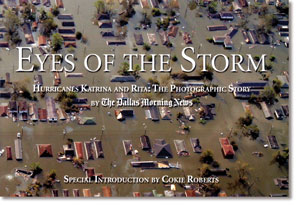| Inside a Washington insider | Teen alum amazes | The singing cancer crusader |
| Home Forethought President's Message Campus Buzz Feature Stories Re:Search The Score Alum News Yesteryear | ||
It was April 17, the day the 2006 Pulitzer Prize winners would be announced. The list of finalists had leaked out, so the eight Dallas Morning News photographers knew their coverage of Hurricane Katrina was nominated in breaking news photography.
Winning a Pulitzer is a career-making experience. It cements your place among the best in American print journalism. For photographers, that place is alongside legends like Joe Rosenthal, whose iconic image of solders raising the American flag over battle-scarred Iwo Jima in 1945 became the model for a memorial near Arlington National Cemetery.
No higher honor is bestowed in the profession.
“Once we found out we were finalists, it was very quiet around the office,” said Tom Fox, one of three UT Arlington graduates who were part of the team. “It was only spoken about in hushed tones so we wouldn’t jinx it.”
As the hour approached, Fox and fellow alumni Michael Ainsworth and Brad Loper—all Shorthorn exes—gathered around a single computer in the Morning News newsroom. The rest of the photography and news staff joined them, waiting for the announcement to hit the Associated Press wire.
“As I leaned in, all I saw was the word Dallas, and I knew we had done it,” Fox said. “In the blur that ensued, I remember being awash in excitement. Camera flashes fired and video rolled, recording all the cheers, hugs and high-fives.”
Elation, relief, reservation, humility, shock and joy are how Ainsworth and Loper describe their reactions. And ambivalence. The honor, after all, resulted from one of the worst natural disasters in U.S. history.
“It was hard to get too excited about something that caused so much suffering for so many people,” Loper said. “When you look at the history of the Pulitzer Prize and all those who have been awarded before us, it makes it a truly humbling experience.”
The winning entry included four of Ainsworth’s photos and one each from Fox and Loper (see cover story). Other team members were Melanie Burford, Barbara Davidson, Michael Mulvey, Smiley N. Pool and Irwin Thompson. The prize came with a $10,000 award, which they donated to Katrina charities.
Back at UT Arlington, The Shorthorn newsroom shared the acclaim.
“It was like a member of the family winning a Pulitzer,” Student Publications Director Lloyd Goodman said. “They are regulars in the newsroom, training and critiquing our current photographers’ work. It reminded current staffers that this is a good starting place if they want to become the best in their field.”
Former Student Publications Director Dorothy Estes recruited Ainsworth and Loper more than 15 years ago. Fox, she recalls, “just sort of fell into my lap.” All were here at the same time, though not for their entire college careers, and graduated in the early 1990s.
“I expected all of them to win a Pulitzer some day, but I didn’t think it would be in my lifetime,” said Estes, who retired in 1996. “They are all fearless, competitive and sensitive, and that is what helped them win the award.”
Such praise has become commonplace for the trio, but their daily lives haven’t changed much.
“It’s cool that people outside journalism understand and have heard about the Pulitzer. When you’re mentioned in this context, people’s ears do perk up a bit,” Loper said. “But in the day-to-day, it hasn’t changed me or who I am. Besides, I have three boys to help keep me humble.”
For Fox, it’s been business as usual.
“As one of my editors told me, ‘Back to work,’ which meant just go on doing what you’ve always done. Shoot good pictures and tell the readers good stories.”
Ainsworth has enjoyed reconnecting with people he hadn’t heard from in a while. He has had to learn to speak in front of groups, something he says he didn’t master in one semester of speech at UT Arlington.
“Like I tell people, at least now I can have Pulitzer Prize winner in my obituary,” he said. “Now all I have to do is try and top that accomplishment.”
Letters to the editor: utamagazine@uta.edu
— Mark Permenter
| Archives
| Alumni Association |
Giving to UT Arlington | UT
Arlington Home Copyright © 2006 UT Arlington Magazine. All rights reserved. |

